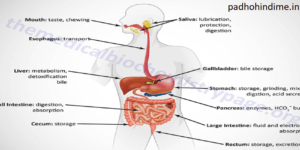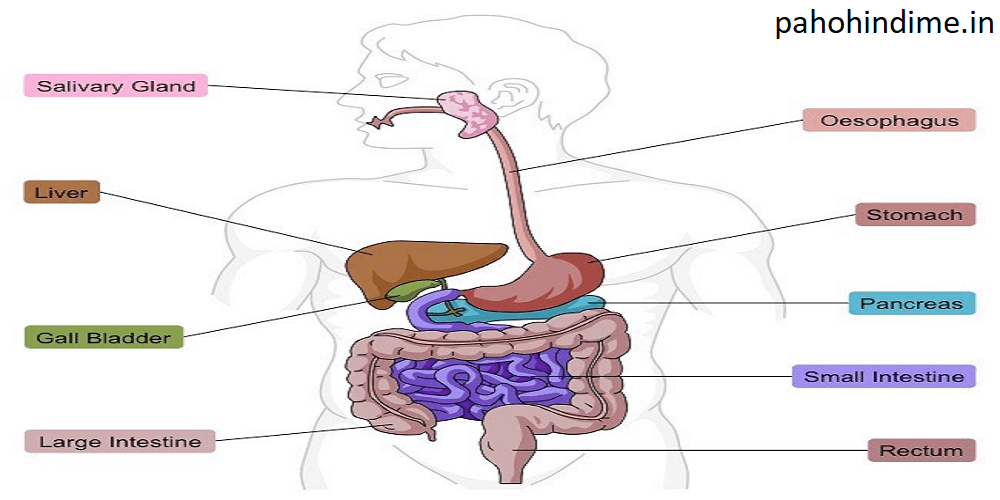Human Digestive System.
The digestive system is responsible for breaking down food into nutrients that can be absorbed by the body. This process is achieved through the following steps:
How to Turn of Autocorrect in your iphone
- Ingestion: The process of taking food into the mouth is called ingestion. During this process, the teeth and tongue work together to break the food into smaller pieces, and saliva is released from the salivary glands to moisten the food and begin the process of breaking down carbohydrates.
- Digestion: Once the food has been broken down into smaller pieces, it moves down the esophagus and into the stomach. In the stomach, digestive enzymes and hydrochloric acid are released to break down proteins and kill any harmful bacteria that may be present. The stomach muscles then contract to mix the food with these digestive juices and turn it into a semi-liquid mixture called chyme.
- Absorption: From the stomach, the chyme moves into the small intestine, where the majority of nutrient absorption occurs. The walls of the small intestine are lined with tiny finger-like projections called villi, which increase the surface area for nutrient absorption. Nutrients are absorbed into the bloodstream and transported to the liver for processing.
- Elimination: The remaining waste products that cannot be digested or absorbed are passed into the large intestine. The large intestine absorbs any remaining water and electrolytes from the waste, and bacteria in the large intestine break down any remaining food particles. The waste products are then eliminated from the body through the rectum and anus in the form of feces.
Overall, the digestive system is a complex and highly coordinated process that involves many organs and systems working together to break down food and absorb nutrients.

The Power of Your Subconscious Mind
Why is digestion important?
Digestion is important for several reasons:
- Nutrient Absorption: The primary purpose of digestion is to break down food into smaller molecules that can be absorbed into the bloodstream and used by the body for energy, growth, and repair. Without digestion, we would not be able to absorb nutrients from food, and our bodies would not be able to function properly.
- Energy Production: The carbohydrates, fats, and proteins in our food provide the body with the energy it needs to carry out daily activities, from walking and talking to breathing and pumping blood. Without digestion, these nutrients would not be broken down into a usable form, and our bodies would not be able to produce energy.
- Waste Removal: Digestion also plays an important role in removing waste products from the body. The large intestine absorbs water and electrolytes from the remaining waste material, and the rectum and anus eliminate this waste in the form of feces. Without this process, waste products would build up in the body and cause serious health problems.
- Maintaining a Healthy Microbiome: The digestive system is also home to trillions of bacteria that play an important role in maintaining our health. These bacteria help break down food, produce vitamins, and support our immune system. A healthy microbiome is essential for good digestion and overall health.
In summary, digestion is essential for nutrient absorption, energy production, waste removal, and maintaining a healthy microbiome. Without digestion, our bodies would not be able to function properly and our health would be severely compromised.

How does body control the digestive process?
The digestive process is controlled by a complex interplay of nervous, hormonal, and muscular systems in the body. Here are some of the ways in which the body controls the digestive process:
- Nervous System: The digestive process is regulated by the autonomic nervous system, which is divided into the sympathetic and parasympathetic nervous systems. The sympathetic nervous system inhibits digestion, while the parasympathetic nervous system stimulates it. The brain sends signals to these systems based on the type and quantity of food ingested, and the body responds accordingly.
- Hormonal System: The digestive system is also regulated by hormones produced by the digestive organs themselves. For example, the hormone gastrin stimulates the release of stomach acid, while secretin and cholecystokinin (CCK) stimulate the release of enzymes from the pancreas and bile from the gallbladder.
- Muscular System: The digestive system is composed of a series of muscles that work together to move food through the digestive tract. These muscles contract and relax in a coordinated fashion, a process called peristalsis, which helps move food along the digestive tract.
- Reflexes: The digestive system also has its own reflexes, which are initiated by the presence of food in the digestive tract. For example, the gastrocolic reflex stimulates the movement of food from the stomach into the small intestine, while the defecation reflex triggers the elimination of waste material from the body.
In summary, the digestive process is regulated by a complex interplay of nervous, hormonal, and muscular systems in the body, which work together to control the rate and efficiency of digestion. These systems are influenced by a variety of factors, including the type and quantity of food ingested, the body’s nutritional needs, and the presence of any digestive disorders.




